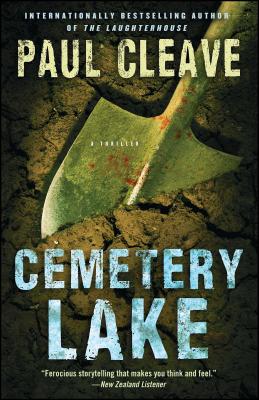Cemetery Lake begins in a cold and rainy
graveyard, where Private Detective Theodore Tate is overseeing an
exhumation—a routine job for the weathered former cop. But when doubts
are raised about the identity of the body found in the coffin, the case
takes a sinister turn. Tate knows he should walk away and let his former
colleagues on the police force deal with it, but his strong sense of
justice intervenes.
Complicating matters are a few loose ends from Tate’s past. Even good guys have secrets, and Tate thought his were dead and buried for good. With time running out and a violent killer lurking, will he manage to stay one step ahead of the police, or will his truth be unearthed?
Originally published in Paul Cleave’s native New Zealand in 2008, Cemetery Lake is the first novel to feature Theodore Tate, the “quintessential flawed hero” (Kirkus Reviews) from Collecting Cooper and The Laughterhouse. Full of the clever plot twists and sardonic humor for which Cleave has become known, it is at once a totally entertaining crime novel and an unforgettable drama about the universal battle against the darkness within.
Hank says:
"I've never been much of a fan of hardboiled mysteries, with the exception of Dan Simmons' Joe Kurtz books, but I decided to pick up this example of New Zealand noir and give it a try. In spite of another book I'm very excited to read coming my way in the middle of it, Cemetery Lake was compelling enough that I wanted to keep reading and find out how the story would end.
Theo Tate, an ex-cop in Christchurch, now struggling along as a private investigator has a wretched life to begin with, and it goes from bad to worse, and then to worse and worse and even worse than that, over the course of his investigation. I never let myself think "worst," because, well, who knows? After awhile, the situation started to strike me as weirdly comical, whether or not that was Cleave's intention. The plot involves various makeshift exhumations and burials, and Tate keeps being blamed for things he did not do, and not blamed for things he did do. Somehow, he manages to keep a step ahead of everybody else and unravel the whole mess, with one of his subsidiary antagonists receiving a satisfying, if offstage, comeuppance."
Complicating matters are a few loose ends from Tate’s past. Even good guys have secrets, and Tate thought his were dead and buried for good. With time running out and a violent killer lurking, will he manage to stay one step ahead of the police, or will his truth be unearthed?
Originally published in Paul Cleave’s native New Zealand in 2008, Cemetery Lake is the first novel to feature Theodore Tate, the “quintessential flawed hero” (Kirkus Reviews) from Collecting Cooper and The Laughterhouse. Full of the clever plot twists and sardonic humor for which Cleave has become known, it is at once a totally entertaining crime novel and an unforgettable drama about the universal battle against the darkness within.
Hank says:
"I've never been much of a fan of hardboiled mysteries, with the exception of Dan Simmons' Joe Kurtz books, but I decided to pick up this example of New Zealand noir and give it a try. In spite of another book I'm very excited to read coming my way in the middle of it, Cemetery Lake was compelling enough that I wanted to keep reading and find out how the story would end.
Theo Tate, an ex-cop in Christchurch, now struggling along as a private investigator has a wretched life to begin with, and it goes from bad to worse, and then to worse and worse and even worse than that, over the course of his investigation. I never let myself think "worst," because, well, who knows? After awhile, the situation started to strike me as weirdly comical, whether or not that was Cleave's intention. The plot involves various makeshift exhumations and burials, and Tate keeps being blamed for things he did not do, and not blamed for things he did do. Somehow, he manages to keep a step ahead of everybody else and unravel the whole mess, with one of his subsidiary antagonists receiving a satisfying, if offstage, comeuppance."


No comments:
Post a Comment